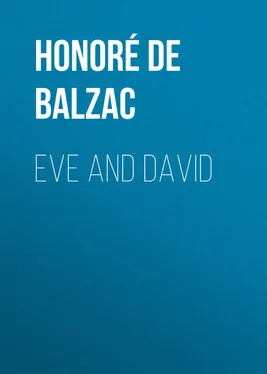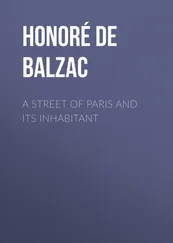Honoré Balzac - Eve and David
Здесь есть возможность читать онлайн «Honoré Balzac - Eve and David» — ознакомительный отрывок электронной книги совершенно бесплатно, а после прочтения отрывка купить полную версию. В некоторых случаях можно слушать аудио, скачать через торрент в формате fb2 и присутствует краткое содержание. Жанр: literature_19, foreign_antique, foreign_prose, на английском языке. Описание произведения, (предисловие) а так же отзывы посетителей доступны на портале библиотеки ЛибКат.
- Название:Eve and David
- Автор:
- Жанр:
- Год:неизвестен
- ISBN:нет данных
- Рейтинг книги:3 / 5. Голосов: 1
-
Избранное:Добавить в избранное
- Отзывы:
-
Ваша оценка:
- 60
- 1
- 2
- 3
- 4
- 5
Eve and David: краткое содержание, описание и аннотация
Предлагаем к чтению аннотацию, описание, краткое содержание или предисловие (зависит от того, что написал сам автор книги «Eve and David»). Если вы не нашли необходимую информацию о книге — напишите в комментариях, мы постараемся отыскать её.
Eve and David — читать онлайн ознакомительный отрывок
Ниже представлен текст книги, разбитый по страницам. Система сохранения места последней прочитанной страницы, позволяет с удобством читать онлайн бесплатно книгу «Eve and David», без необходимости каждый раз заново искать на чём Вы остановились. Поставьте закладку, и сможете в любой момент перейти на страницу, на которой закончили чтение.
Интервал:
Закладка:
The Shepherd’s Calendar ought by rights to have been ready before the 1st of January, but Cerizet was working unaccountably slowly; all the work of composing fell to him; and Mme. Sechard, knowing so little, could not find fault, and was fain to content herself with watching the young Parisian.
Cerizet came from the great Foundling Hospital in Paris. He had been apprenticed to the MM. Didot, and between the ages of fourteen and seventeen he was David Sechard’s fanatical worshiper. David put him under one of the cleverest workmen, and took him for his copy-holder, his page. Cerizet’s intelligence naturally interested David; he won the lad’s affection by procuring amusements now and again for him, and comforts from which he was cut off by poverty. Nature had endowed Cerizet with an insignificant, rather pretty little countenance, red hair, and a pair of dull blue eyes; he had come to Angouleme and brought the manners of the Parisian street-boy with him. He was formidable by reason of a quick, sarcastic turn and a spiteful disposition. Perhaps David looked less strictly after him in Angouleme; or, perhaps, as the lad grew older, his mentor put more trust in him, or in the sobering influences of a country town; but be that as it may, Cerizet (all unknown to his sponsor) was going completely to the bad, and the printer’s apprentice was acting the part of a Don Juan among little work girls. His morality, learned in Paris drinking-saloons, laid down the law of self-interest as the sole rule of guidance; he knew, moreover, that next year he would be “drawn for a soldier,” to use the popular expression, saw that he had no prospects, and ran into debt, thinking that soon he should be in the army, and none of his creditors would run after him. David still possessed some ascendency over the young fellow, due not to his position as master, nor yet to the interest that he had taken in his pupil, but to the great intellectual power which the sometime street-boy fully recognized.
Before long Cerizet began to fraternize with the Cointets’ workpeople, drawn to them by the mutual attraction of blouse and jacket, and the class feeling, which is, perhaps, strongest of all in the lowest ranks of society. In their company Cerizet forgot the little good doctrine which David had managed to instil into him; but, nevertheless, when the others joked the boy about the presses in his workshop (“old sabots,” as the “bears” contemptuously called them), and showed him the magnificent machines, twelve in number, now at work in the Cointets’ great printing office, where the single wooden press was only used for experiments, Cerizet would stand up for David and fling out at the braggarts.
“My gaffer will go farther with his ‘sabots’ than yours with their cast-iron contrivances that turn out mass books all day long,” he would boast. “He is trying to find out a secret that will lick all the printing offices in France and Navarre.”
“And meantime you take your orders from a washer-woman, you snip of a foreman, on two francs a day.”
“She is pretty though,” retorted Cerizet; “it is better to have her to look at than the phizes of your gaffers.”
“And do you live by looking at his wife?”
From the region of the wineshop, or from the door of the printing office, where these bickerings took place, a dim light began to break in upon the brothers Cointet as to the real state of things in the Sechard establishment. They came to hear of Eve’s experiment, and held it expedient to stop these flights at once, lest the business should begin to prosper under the poor young wife’s management.
“Let us give her a rap over the knuckles, and disgust her with the business,” said the brothers Cointet.
One of the pair, the practical printer, spoke to Cerizet, and asked him to do the proof-reading for them by piecework, to relieve their reader, who had more than he could manage. So it came to pass that Cerizet earned more by a few hours’ work of an evening for the brothers Cointet than by a whole day’s work for David Sechard. Other transactions followed; the Cointets seeing no small aptitude in Cerizet, he was told that it was a pity that he should be in a position so little favorable to his interests.
“You might be foreman some day in a big printing office, making six francs a day,” said one of the Cointets one day, “and with your intelligence you might come to have a share in the business.”
“Where is the use of my being a good foreman?” returned Cerizet. “I am an orphan, I shall be drawn for the army next year, and if I get a bad number who is there to pay some one else to take my place?”
“If you make yourself useful,” said the well-to-do printer, “why should not somebody advance the money?”
“It won’t be my gaffer in any case!” said Cerizet.
“Pooh! Perhaps by that time he will have found out the secret.”
The words were spoken in a way that could not but rouse the worst thoughts in the listener; and Cerizet gave the papermaker and printer a very searching look.
“I do not know what he is busy about,” he began prudently, as the master said nothing, “but he is not the kind of man to look for capitals in the lower case!”
“Look here, my friend,” said the printer, taking up half-a-dozen sheets of the diocesan prayer-book and holding them out to Cerizet, “if you can correct these for us by to-morrow, you shall have eighteen francs to-morrow for them. We are not shabby here; we put our competitor’s foreman in the way of making money. As a matter of fact, we might let Mme. Sechard go too far to draw back with her Shepherd’s Calendar , and ruin her; very well, we give you permission to tell her that we are bringing out a Shepherd’s Calendar of our own, and to call her attention too to the fact that she will not be the first in the field.”
Cerizet’s motive for working so slowly on the composition of the almanac should be clear enough by this time.
When Eve heard that the Cointets meant to spoil her poor little speculation, dread seized upon her; at first she tried to see a proof of attachment in Cerizet’s hypocritical warning of competition; but before long she saw signs of an over-keen curiosity in her sole compositor – the curiosity of youth, she tried to think.
“Cerizet,” she said one morning, “you stand about on the threshold, and wait for M. Sechard in the passage, to pry into his private affairs; when he comes out into the yard to melt down the rollers, you are there looking at him, instead of getting on with the almanac. These things are not right, especially when you see that I, his wife, respect his secrets, and take so much trouble on myself to leave him free to give himself up to his work. If you had not wasted time, the almanac would be finished by now, and Kolb would be selling it, and the Cointets could have done us no harm.”
“Eh! madame,” answered Cerizet. “Here am I doing five francs’ worth of composing for two francs a day, and don’t you think that that is enough? Why, if I did not read proofs of an evening for the Cointets, I might feed myself on husks.”
“You are turning ungrateful early,” said Eve, deeply hurt, not so much by Cerizet’s grumbling as by his coarse tone, threatening attitude, and aggressive stare; “you will get on in life.”
“Not with a woman to order me about though, for it is not often that the month has thirty days in it then.”
Feeling wounded in her womanly dignity, Eve gave Cerizet a withering look and went upstairs again. At dinner-time she spoke to David.
“Are you sure, dear, of that little rogue Cerizet?”
“Cerizet!” said David. “Why, he was my youngster; I trained him, I took him on as my copy-holder. I put him to composing; anything that he is he owes to me, in fact! You might as well ask a father if he is sure of his child.”
Читать дальшеИнтервал:
Закладка:
Похожие книги на «Eve and David»
Представляем Вашему вниманию похожие книги на «Eve and David» списком для выбора. Мы отобрали схожую по названию и смыслу литературу в надежде предоставить читателям больше вариантов отыскать новые, интересные, ещё непрочитанные произведения.
Обсуждение, отзывы о книге «Eve and David» и просто собственные мнения читателей. Оставьте ваши комментарии, напишите, что Вы думаете о произведении, его смысле или главных героях. Укажите что конкретно понравилось, а что нет, и почему Вы так считаете.












